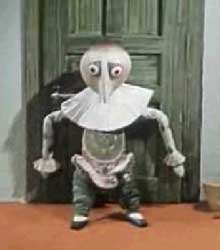 One of Jiri Trnka's finest puppet animation films seems to be the inspiration for the puppet animation from Saturday Night Live many years ago, about Mr. Bill & the terrorizing Mr. Hand.
One of Jiri Trnka's finest puppet animation films seems to be the inspiration for the puppet animation from Saturday Night Live many years ago, about Mr. Bill & the terrorizing Mr. Hand.
But of course Jiri Trnka's The Hand (Ruka, 1965) is more elegant & wry rather than just silly & cruel, though there certainly is an element of cruelty too. It was banned by the Czech government because too easily seen as a parable about the cruelty of totalitarian government.
The Hand is eighteen minutes long. Our happy young man awakes in the morning to the birdies singing & does his exercises, waters his plant, & begins working at his pottery wheel. His room is very simply arranged without much clutter, except for a lot of pots.
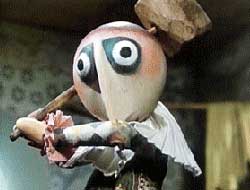 There comes a knock at the door, but when he answers it, there's no one there. Instead, the window shutters have been thrust open, breaking the pot with his plant in it, & in steps the Hand. There comes a knock at the door, but when he answers it, there's no one there. Instead, the window shutters have been thrust open, breaking the pot with his plant in it, & in steps the Hand.
Our hero bows with a flourish to the hand, but is soon quite annoyed with it for trying to change his clay plot in progress into a clay hand.
He invites the hand to leave, but every noise outside bothers him & keeps him unable to work.
He replants his beloved plant & copes with the lump of clay the hand was mucking with, which now won't hold the shape of a pot but keeps turning into a hand.
The hand delivers a telephone to the door, then keeps calling the potter, offering him money to make hands instead of pots, but the potter has no such interest.
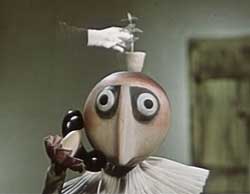 The hand next delivers a television which features shows starring hands. Despite himself the potter is fascinating by the television. The hand next delivers a television which features shows starring hands. Despite himself the potter is fascinating by the television.
But when the hand again squashes his unfinished pot, he takes out a mallet & attacks the hand, pounding its fingers one by one.
He forces the hand into the box the television & phone came in, then throws the box & telly outdoors. He cleans up the mess the hand made, & finds his beloved plant again needing a new pot.
But all too soon the hand returns, this time with a vengeance, trying to pound or grab the little guy as he leaps about evading destruction.
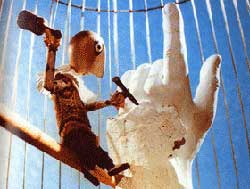 When the hand catches him, it just puts the guy by his potting wheel commanding him to make pottery hands. When the hand catches him, it just puts the guy by his potting wheel commanding him to make pottery hands.
Still he won't do it, so the hand puts on a fishnet glove & does a seductive hoochy-koochy dance, then ties strings to the fellow to turn him into a marrionette, putting him in a big bird cage & with the strings forcing him to carve a great hand from marble.
When it's finished, the hand places laurels on the puppet's head, & pins a medal to his blouse.
But the puppet burns off the marrionette strings & flees into the blue cosmos seeking to escape, eventually finding his way back to his tidy apartment, which he nails closed from the inside to keep the hand out.
But by a strange accident, it is not the hand that destroys him, but his own beloved plant, & the caressing hand provides a final resting place.
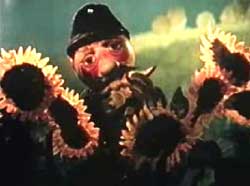 One of the many great things about East European puppet animation is the tradition that arose of having little or no dialogue. It makes these films truly international in appeal, requiring no subtitles or ruinous replacement dubbing; they provide the same experience in any country released just as the filmmakers made them.
One of the many great things about East European puppet animation is the tradition that arose of having little or no dialogue. It makes these films truly international in appeal, requiring no subtitles or ruinous replacement dubbing; they provide the same experience in any country released just as the filmmakers made them.
At the same time the genre arose in a specific region amongst artists well aware of one another's work, during the cold war "Iron Curtain" era which allowed this artform to develop without too much intrusion from Hollywood commercialism. These films are thus frequently intriguing little mirrors of their specific small nations or cultures.
The Devil's Mill (Certuv mlyn, 1949) is one of these magically universal & region-specific films, a folk tale connecting it to peasant tradition, with beauty & oddity & wonder.
An elderly organ grinder tramps the countryside trying to earn his way with his small crank-organ rather than as a beggar, but the box makes fairly hideous music & does not help him make his way as easily as he might've hoped.
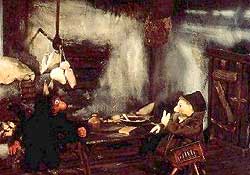 With his sad, sad visage, when he plays, even for insects rebuke his musical ineptitude. At one peasant household, a mother closes the shutters against his raucous attempt to entertain. But her small boy pities the travelling organ grinder & gives him a piece of bread. With his sad, sad visage, when he plays, even for insects rebuke his musical ineptitude. At one peasant household, a mother closes the shutters against his raucous attempt to entertain. But her small boy pities the travelling organ grinder & gives him a piece of bread.
The traveller in turn meets at a tiny roadside shrine an elderly cripple even poorer than himself. Although about to eat his crust of bred, he pities the saintly-looking cripple, & gives him the bread. Out of aprpeciation, the cripple hands the traveller a silver handle for his crank-organ.
Under moonlight, seated beside a frog pond, he switches the handles on his crank-organ. When he uses the old handle, it makes the frogs leap in the water & hide. When he uses the silver handle, the melodic music-box induces the happy frogs to dance on lilypads.
Before the night is over he finds his way to an old mill where he seems to discover another reward for having given up his chance for a meal of bread to assist the crippled saint. Not only has he shelter in the mill, but a table has been spread with a giant loaf of bread, a whole roast chicken, & a plate heaped with cookies, not to mention beer & tobacco, & clean linen pyjamas & bedding.
But as he tries to sleep, his pillow leaps out of bed & runs from the room. His linen pyjamas & the furnishings in the room come alive & attack him. A weird laughing demon manifests, & it is now all to clear why the mill has been abandoned.
With calm innocence the wanderer does battle with teh devil, culkminating his using the silver crank in the crank-organ, inducing the devil to dance even as the frogs had danced at the pond. The horned being's dark magic complete comes undone & he has no control over his physical motions. The faster the organ-grinder plays the music box, the more injury the devil does to himself flinging himself about wildly, until finally he is catapulted into the sky.
The mill belonged to the mother & son who had given the traveller bread the day before, & now they are able to put the mill back in service, & the traveller has a place to settle down. Ah, happy endings.
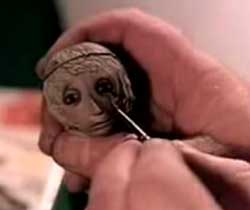 Jiri Trnka: Puppet Animation Master (1999) is shown at the start of this documentary drawing his characters, painting his miniatures & puppets, & creating elaborate sets for his animated films. A narrator for this twelve-minute film gives us a synoptic overview of Trnka's life from earliest childhood on.
Jiri Trnka: Puppet Animation Master (1999) is shown at the start of this documentary drawing his characters, painting his miniatures & puppets, & creating elaborate sets for his animated films. A narrator for this twelve-minute film gives us a synoptic overview of Trnka's life from earliest childhood on.
As a child he helped his grandmother make toy horses & dolls. By age eleven he worked in the puppet theater of Josef Scoupa.
Trnka with Scoupa's assistance went to a prestigeous arts academy & afterward became a successful illustrator of children's books, with a classical style reminiscent of Charles Dulac or the Symbolists, many examples of which are shown in this documentary.
 The biographical outline is delivered in the dryest terms, but the pictoriality of seeing Trnka's art & puppets & sets keeps it most appealing. The biographical outline is delivered in the dryest terms, but the pictoriality of seeing Trnka's art & puppets & sets keeps it most appealing.
Regarded by many as the most aesthetic puppet animator of all time, Trnka has never been well known in America, although to animation afficianodos worldwide he is legendary.
In 1945 he began to oversee a group of young artists fascinated by the possibilities of animation. A year later, he arrived at Cannes with three short films, one of which took an award.
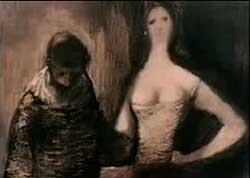 The documentary shows exemplary scenes from many of Trnka's puppetoons, making it a great introduction to his sophisticated films. We also see Trnka at work animating his puppets & filming them frame by frame by frame. The documentary shows exemplary scenes from many of Trnka's puppetoons, making it a great introduction to his sophisticated films. We also see Trnka at work animating his puppets & filming them frame by frame by frame.
Trnka the man appears as a large chain-smoking kind of scary guy with a deep gouged scar down his cheek. If he were to show up at the casting department, he'd have to play a murderous thug.
He was all too aware of how his imposing appearance came off, & he had a deep streak of melancholy, such as gave depth to his films that might otherwise have ended up being only kiddy fair. As they stand, they are works of great art. "Trnka," said Jean Cocteau. "The very name conjures up childhood & poetry."
copyright © by Paghat the Ratgirl
|
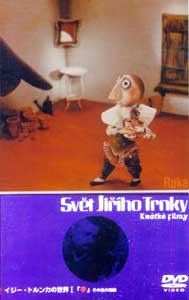

 There comes a knock at the door, but when he answers it, there's no one there. Instead, the window shutters have been thrust open, breaking the pot with his plant in it, & in steps the Hand.
There comes a knock at the door, but when he answers it, there's no one there. Instead, the window shutters have been thrust open, breaking the pot with his plant in it, & in steps the Hand. The hand next delivers a television which features shows starring hands. Despite himself the potter is fascinating by the television.
The hand next delivers a television which features shows starring hands. Despite himself the potter is fascinating by the television. When the hand catches him, it just puts the guy by his potting wheel commanding him to make pottery hands.
When the hand catches him, it just puts the guy by his potting wheel commanding him to make pottery hands.
 With his sad, sad visage, when he plays, even for insects rebuke his musical ineptitude. At one peasant household, a mother closes the shutters against his raucous attempt to entertain. But her small boy pities the travelling organ grinder & gives him a piece of bread.
With his sad, sad visage, when he plays, even for insects rebuke his musical ineptitude. At one peasant household, a mother closes the shutters against his raucous attempt to entertain. But her small boy pities the travelling organ grinder & gives him a piece of bread.
 The biographical outline is delivered in the dryest terms, but the pictoriality of seeing Trnka's art & puppets & sets keeps it most appealing.
The biographical outline is delivered in the dryest terms, but the pictoriality of seeing Trnka's art & puppets & sets keeps it most appealing. The documentary shows exemplary scenes from many of Trnka's puppetoons, making it a great introduction to his sophisticated films. We also see Trnka at work animating his puppets & filming them frame by frame by frame.
The documentary shows exemplary scenes from many of Trnka's puppetoons, making it a great introduction to his sophisticated films. We also see Trnka at work animating his puppets & filming them frame by frame by frame.